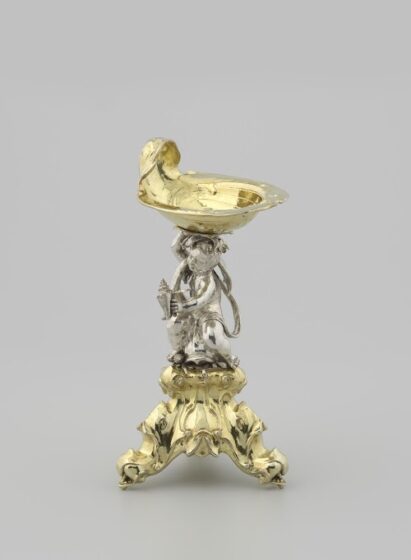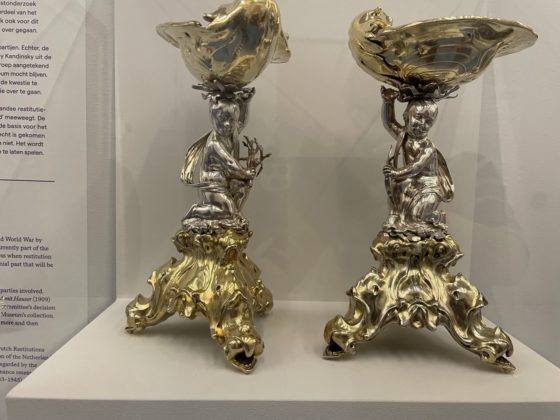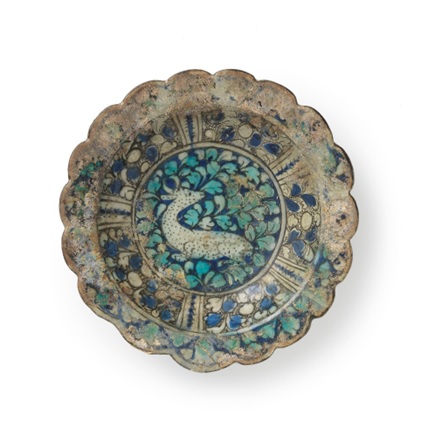Precious objects lost in Nazi Germany to be restored to rightful heirs


Six precious artefacts – together estimated to be worth more than €3 million – will be returned to the heirs of German Jewish woman Emma Budge from museums in Amsterdam and The Hague.
In the first major sign of a new policy of ‘humanity and goodwill’ announced by former culture minister Ingrid van Engelshoven, the Dutch Restitutions Committee has recommended returning six pieces considered ‘involuntary sales’ under the Nazi regime.
Four are salt cellars by 16th century craftsman, and Rembrandt contemporary Johannes Lutma – acquired by Amsterdam city council in 1960 and until recently on show in the Rijksmuseum and Amsterdam Museum.
The other objects are a goblet holder by 17th century artist Andries Grill and a pottery dish, bought by The Hague city council in 1937 and in the Kunstmuseum Den Haag.
These objects were in the same sale as a bronze sculpture, Moses, attributed to Alessandro Vittoria, which was designated ‘looted art’ and returned in 2018, but this decision has taken far longer.
Steven Schwab, one of the heirs of the Emma Budge estate, told Dutch News that he was happy with the ruling and also open to the artefacts remaining in the Netherlands.
‘We are pleased that the advisory committee has reaffirmed that these priceless objects from the collection of Emma Budge were taken illegally by the Nazi regime in 1937 and that they should be restituted to her heirs,’ he told Dutch News. ‘My hope is that a proper settlement can be reached with the Rijksmuseum and the Amsterdam Museum so that these beautiful pieces can be seen by countless patrons of the museums.’
The story of the Lutma salt cellars

Emma Budge
In two ‘binding opinions’ published on Thursday, the Restitutions Committee advised the Dutch councils to return the works to the heirs of Emma Budge since it is ‘sufficiently plausible that her beneficiaries involuntarily lost possession of them after her death.’
Emma Budge, a wealthy Jewish resident of Hamburg with American citizenship, had a large art collection. But after her death in 1937, contrary to her wishes, her artworks were auctioned at the ‘Aryanized’ Paul Graupe auction house in Berlin – some bought directly by the Hague municipality and others eventually making their way into Amsterdam’s collection.
The committee has ruled that since Budge and her heirs belonged to a persecuted group and the loss of ownership happened during the Nazi regime, ‘the committee must assume that the loss of possession was involuntary’ unless proven otherwise. It added that it is ‘plausible’ that Budge’s beneficiaries could not freely dispose of the proceeds of the sale either, due to anti-Jewish measures under the Nazis.
Lothar Fremy, a partner at Berlin law firm Rechtsanwälte Rosbach & Fremy, representing the heirs, said that the decision – although slow – was deeply valued. ‘The Budge heirs highly appreciate this gesture of responsibility by the Restitutie Commissie and thanks it for this recommendation, although it would have been desirable that several years had not been required for this,’ he told Dutch News.

Moral obligation
The news was welcomed by Amsterdam Museum, which had labelled two Lutma salt cellars as potentially ‘looted’ art as part of a new display on the Second World War this year. ‘This restitution does justice to history,’ said Judikje Kiers, director, in a statement. ‘The investigation into the history of these objects and their provenance was meticulously carried out. It is a good thing that we can now take this step regarding returning the salt cellars to their rightful owner, the heirs of Mrs Emma Budge.’
Doede Hardeman, head of collections at Kunstmuseum Den Haag also welcomed the decision and is preparing to return the objects in its collection. ‘It is important for the museum that there is a verdict that does right by history,’ he told Dutch News. The Rijksmuseum added in a statement that it fully stood behind the decision ‘to restore the rights of relatives of victims of the Holocaust and the Nazi regime’.
In The Hague, deputy mayor for culture Saskia Bruines said that the city had no hesitation in following the committee’s recommendations. ‘To repair some element of the injustice that was done in that time, it is important that these objects are returned to the heirs,’ she said.
Touria Meliani, deputy mayor for art and culture at Amsterdam municipal council, said that the city also felt a ‘moral obligation’ to restitute the four salt cellars owned by the city. ‘The suffering caused to Jewish citizens in particular during the Second World War is unprecedented and irreversible,’ she said.
‘Jewish citizens had their possessions, rights, dignity, and in many cases their lives, taken from them… Restoration of these works of art can be very significant for the victims and is of great importance for recognising the injustices done to them.’
Thank you for donating to DutchNews.nl.
We could not provide the Dutch News service, and keep it free of charge, without the generous support of our readers. Your donations allow us to report on issues you tell us matter, and provide you with a summary of the most important Dutch news each day.
Make a donation